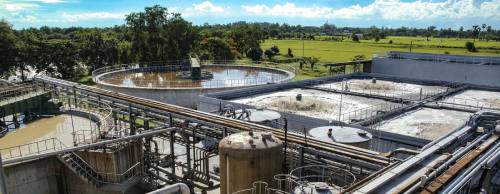The city of Katy is planning an estimated $3 million expansion of its wastewater treatment facility with construction set to begin in 2018. While the city’s existing facility is a few years from reaching capacity, city Engineer David Leyendecker said the city wants to stay ahead of growth.
“I would estimate that we have about three years [until the plant reaches capacity] with the growth the way it is now,” he said.
 The existing facility can handle up to 3.075 million gallons of wastewater daily but averages only about 60 percent of that capacity, officials said.
The existing facility can handle up to 3.075 million gallons of wastewater daily but averages only about 60 percent of that capacity, officials said.
“We’ve got plenty of capacity,” city Administrator Byron Hebert said.
Based on criteria from the Texas Commission on Environmental Quality, the city must begin the design process for a plant expansion when the existing facility’s three-month average flow reaches 75 percent capacity, Leyendecker said.
“The city of Katy has always tried to stay ahead of this [expansion] schedule to insure that problems don’t arise,” he said.
Design for the expansion is about 25 percent complete and is expected to be finished in two to three months, Leyendecker said. He added that the city could receive its permit for the expansion within 60 days from the TCEQ, pending any public comments.
“We’ll be ready to bid the project probably in the first quarter of 2018, probably January or February,” he said. “It will take probably eight to 10 months to build that phase of the plant.”
The plant expansion—which will allow the city to process 3.9 million gallons total of wastewater each day—comes at no additional cost to current taxpayers, Leyendecker said. Rather, developers pay a share of the expansion cost through an impact fee charged for each lot or commercial facility being built out.
“Growth pays for growth,” Hebert said. “As a [community] comes in, they need to pay if we have to expand any of our water or any of our sewer [facilities].”
Katy last expanded its wastewater treatment plant in 2005 as part of a multiphase project beginning in the 1970s, Leyendecker said.
Although the city is preparing for growth, the wastewater capacity is closely monitored, Leyendecker said.
“The wastewater operators keep a tally on [water flow] monthly, so we look at [capacity] every month,” he said. “It’s not going to sneak up on us.”





